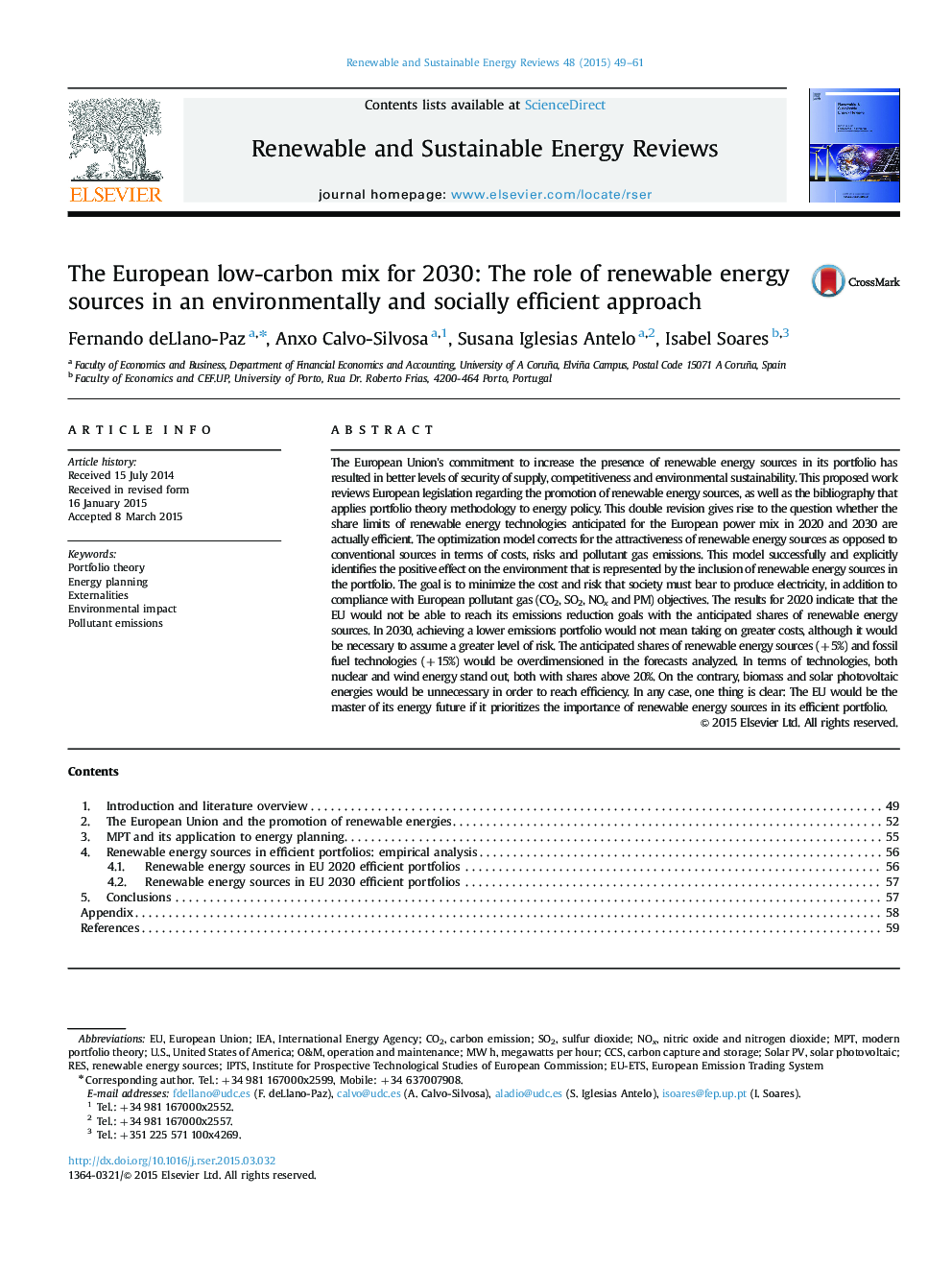| کد مقاله | کد نشریه | سال انتشار | مقاله انگلیسی | نسخه تمام متن |
|---|---|---|---|---|
| 8116403 | 1522337 | 2015 | 13 صفحه PDF | دانلود رایگان |
عنوان انگلیسی مقاله ISI
The European low-carbon mix for 2030: The role of renewable energy sources in an environmentally and socially efficient approach
ترجمه فارسی عنوان
ترکیبی کربن کم کربن در سال 2030: نقش منابع انرژی تجدیدپذیر در یک رویکرد زیست محیطی و اجتماعی
دانلود مقاله + سفارش ترجمه
دانلود مقاله ISI انگلیسی
رایگان برای ایرانیان
کلمات کلیدی
CCSEU-ETSIPTSMPTRESU.S.IEAO&M - A & MNOx - NOXInternational energy agency - آژانس انرژی بین المللیEuropean Union - اتحادیه اروپاExternalities - اثرات جانبیEnvironmental impact - اثرات زیست محیطیPollutant emissions - انتشار آلاینده هاCarbon emission - انتشار کربنUnited States of America - ایالات متحده آمریکاEnergy planning - برنامه ریزی انرژیPortfolio theory - تئوری نمونه کارهاModern Portfolio Theory - تئوری نمونه کارها مدرنCarbon capture and storage - جذب و ذخیره کربنSolar PV - خورشیدی PVSulfur dioxide - دی اکسید گوگردSO2 - دی اکسید گوگردoperation and maintenance - عملیات و نگهداریSolar photovoltaic - فتوولتائیک خورشیدیRenewable energy sources - منابع انرژی تجدیدپذیر CO2 - کربن دیاکسید
موضوعات مرتبط
مهندسی و علوم پایه
مهندسی انرژی
انرژی های تجدید پذیر، توسعه پایدار و محیط زیست
چکیده انگلیسی
The European Union׳s commitment to increase the presence of renewable energy sources in its portfolio has resulted in better levels of security of supply, competitiveness and environmental sustainability. This proposed work reviews European legislation regarding the promotion of renewable energy sources, as well as the bibliography that applies portfolio theory methodology to energy policy. This double revision gives rise to the question whether the share limits of renewable energy technologies anticipated for the European power mix in 2020 and 2030 are actually efficient. The optimization model corrects for the attractiveness of renewable energy sources as opposed to conventional sources in terms of costs, risks and pollutant gas emissions. This model successfully and explicitly identifies the positive effect on the environment that is represented by the inclusion of renewable energy sources in the portfolio. The goal is to minimize the cost and risk that society must bear to produce electricity, in addition to compliance with European pollutant gas (CO2, SO2, NOx and PM) objectives. The results for 2020 indicate that the EU would not be able to reach its emissions reduction goals with the anticipated shares of renewable energy sources. In 2030, achieving a lower emissions portfolio would not mean taking on greater costs, although it would be necessary to assume a greater level of risk. The anticipated shares of renewable energy sources (+5%) and fossil fuel technologies (+15%) would be overdimensioned in the forecasts analyzed. In terms of technologies, both nuclear and wind energy stand out, both with shares above 20%. On the contrary, biomass and solar photovoltaic energies would be unnecessary in order to reach efficiency. In any case, one thing is clear: The EU would be the master of its energy future if it prioritizes the importance of renewable energy sources in its efficient portfolio.
ناشر
Database: Elsevier - ScienceDirect (ساینس دایرکت)
Journal: Renewable and Sustainable Energy Reviews - Volume 48, August 2015, Pages 49-61
Journal: Renewable and Sustainable Energy Reviews - Volume 48, August 2015, Pages 49-61
نویسندگان
Fernando deLlano-Paz, Anxo Calvo-Silvosa, Susana Iglesias Antelo, Isabel Soares,
